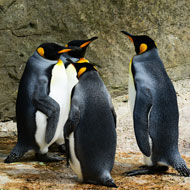King penguins under threat from global warming

For millennia, the king penguin has relied on the Antarctic Polar Front, but due to climate change, this area is drifting south.
Climate change could force over 70 per cent of the world’s king penguins to disappear or move south in a matter of decades, scientists say.
Global warming is pushing king penguins to swim further and further for food, leaving their offspring on the shore for longer periods of time.
Now, an international study is predicting that, for most colonies, the increasing length of these trips will soon result in the starvation of offspring. This could lead to relocation or massive crashes in population size.
For millennia, the king penguin has relied on the Antarctic Polar Front, but due to climate change, this area is drifting south, away from the island where most of the population currently lives. As a result, parents are forced to swim further to find food for their offspring.
Using information from the penguin’s genome, scientists found that past climatic changes over the past 50,000 years have always been linked to critical episodes for the species. However, king penguins have already survived several of these crises - the last of which was 20,000 years ago - and they may be particularly skilled at this.
But scientists say there is a major difference this time. For the first time in the history of penguins, human activities are causing rapid and possibly irreversible changes in the earth system. The Southern Ocean is now subject to industrial fishing, presenting a serious source of competition in the king penguin’s struggle for food.
Céline Le Bohec, from the University of Strasbourg, said: "There are still some islands further south where king penguins may retreat, but the competition for breeding sites and for food will be harsh, especially with the other penguin species like the Chinstrap, Gentoo or Adélie penguins, even without the fisheries.
“It is difficult to predict the outcome, but there will surely be losses on the way. If we want to save anything, proactive and efficient conservation efforts but, above all, coordinated global action against global warming should start now."



 The latest
The latest